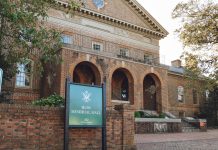By Walter Hickey
The College of William and Mary Debate Team, coming off of a great showing at a tournament at Pennsylvania State University this past weekend, enjoyed success and high rankings during the 2010 season. The team competes under the authority of the student-run American Parliamentary Debate Association, a governing body that counts among its members the debate teams of primarily east coast colleges and universities including Johns Hopkins University, Tufts University, Smith University and several Ivy League schools. The College’s club hosted a debate on campus in September. It plans to hold another in March.
After this weekend, Matt Herdman ’12 and Alex Rosenberg ’12 are ranked 14th as a team, and together they have already qualified for the national tournament. Additionally, Herdman is ranked seventh overall for speaker of the year, Sean Carey ’12 is ranked 25th, and Rosenberg is ranked 32nd. In the novice rankings, PJ Judge ’13 is 14th overall for novice speaker of the year. The College is ranked eighth for club of the year, which looks at the performance of the club as a whole.
This past weekend at the Penn tournament, Herdman and Rosenberg took fifth place as a team. Herdman also won the third-place speaker award, and Rosenberg went home with eighth-place speaker.
The team competes in weekend tournaments hosted at APDA member universities. The tournaments consist of five initial rounds in which all teams compete for eight or 16 spots in the quarterfinal rounds. In an individual round, each two-member team is cast as either the government or the opposition. The government team explains the topic for the debate and presents the two sides of the argument, one of which the opposition selects. A judge chooses the winning team and determining speaker points and ranks for the round.
The speaker points are totaled from round to round to identify the top speakers of the tournament. Awards are allocated to the leading teams, and the APDA takes the results of each tournament and compiles rankings for both teams and individual speakers. There is also a ranking system for novices, or debaters in their first year of debate. Larger tournaments are worth more points, and final round results are worth more than semifinal round results and so on.
Effective debating requires quite a breadth of knowledge.
“One round you could be debating about foreign policy, the next medical ethics, the next a case about Mario Kart,” Herdman said. “William and Mary has cases about all of these things.”
Debate team president Mary Cimaglio ’11 said she is proud of the team’s performance so far.
“I’m really glad that our team has been so successful this year,” she said. “We put in a lot of work at practice and during tournaments, so it has been really satisfying to see it pay off.”
The strong performance of the novice class also impressed Cimaglio, who said she is “especially proud of our strong novice class, which has been doing well at winning best novice team and best novice speaker awards.”
This is not the first year in which the team has been successful. In the past two years, two debaters have taken ninth place speaker of the year: Sam Hynes ’10 in 2008-09 and Ben Strahs ’09 in 2009-10. Two members have won first-place speaker of the year: Robbie Pratt ’06 in 2004-05 and Andy Hill ’08 in 2007-08.
Rosenberg, the team vice president who also serves on the APDA board as an at-large member of its executive board, credits the success of the team in part to the efforts of several of the former debaters.
“The William and Mary Debate team has a tradition of excellent performance on APDA going back to 2003,” he said. “The team patriarch, Arthur Traldi ’03, was the first debater from [the College] to regularly compete on APDA and got our school some notoriety. Robert Pratt — often referred to as the trunk of the team tree (if in this case you consider Traldi the roots) was a debater of phenomenal caliber.”
Rosenberg credits Pratt with beginning a tradition of training younger debaters, which has ensured the success of the College’s team. Another factor he credits is the absence of this sort of culture at other schools.
“The College’s graduate corps of debaters has been super helpful in making Matt and I better, while many of the other school’s graduates don’t help out,” Rosenberg said.
Especially with assistance from alumni debaters, the future of the debate team looks promising, said Herdman.
“I feel like the team has done really well,” he said. “Our senior class is really small, but our junior, sophomore and freshman classes are really shaping up.”
The upcoming season, which extends until early March, will see the debaters gunning to move up in the rankings in an extremely competitive year. Still, Cimaglio said she is optimistic about the future.
“I’m looking forward to the upcoming tournament this weekend, which should highlight our strong novices and strong varsity members,” she said.
_Editor’s note: The headline had a misspelling. This has been corrected._


































